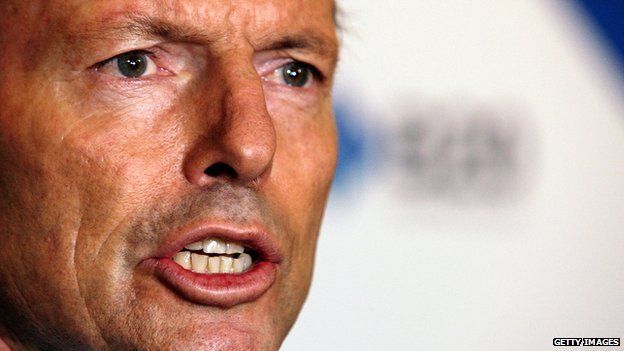Tony Abbott's foreign policy foray
- Published

He's the globetrotting Australian leader who is flexing his diplomatic muscles by branding Russia a "bully" over its actions in Ukraine and comparing Islamic State extremists to a "death cult".
Tony Abbott says Canberra will now send military trainers and advisers to Ukraine, while its aircraft have begun transporting weapons to Kurdish fighters in northern Iraq.
Australia's warplanes are also standing ready to join US airstrikes on Sunni militants.
But as the conservative prime minister revels in a more interventionist foreign policy, there are fears that he risks overstretching his nation's armed forces.
The former trainee priest and Rhodes scholar has seen his global reputation as a straight-talker soar since the shooting down of flight MH17, and the savage advance of Islamist militants in Iraq and Syria.
In the aftermath of the Malaysia Airlines tragedy, in which 38 Australian citizens and residents died, the prime minister quickly blamed pro-Russian separatists for an "unspeakable crime".
Intense lobbying by Mr Abbott and his highly-regarded foreign minister, Julie Bishop, ensured that an Australian-sponsored resolution to allow international investigators free access to the MH17 crash site was passed without opposition by the UN Security Council.
This week, Mr Abbott is on his 11th overseas trip since comprehensively winning an election a year ago, with stopovers in Mumbai, New Delhi and Kuala Lumpur.
"Unexpectedly, he has transformed from a narrow partisan warrior to a genuine national leader speaking for all of us," wrote Terry Barnes, a social policy consultant and former Abbott advisor.
Under-estimated?
Certainly Mr Abbott is rivalling his predecessor Kevin Rudd's zeal for foreign affairs.
The former Labor leader's frequent trips abroad led to the nickname "Kevin 747" and now "Air Abbott" is trying to extend Australia's diplomatic reach even further. A spying row with Indonesia now appears to have been successfully defused and uranium sales to India are at an advanced stage.
Gerard Henderson, head of the conservative think-tank, the Sydney Institute, believes that Mr Abbott is becoming a respected global figure.
"I think he was under-estimated before the election. Some people in Australia didn't take him seriously but on foreign policy, he is well informed," he said. "What he has got going for him is a very strong personality. He holds strong views."
He acknowledged that, on some issues, Mr Abbott was in an easier position than other national leaders.
"It is easier for Australia to speak out than the United States. Tony Abbott does have an ability to make strong comments that perhaps some other nations that are closer to Russia and Ukraine are not able to make."
Underpinning Australia's outspoken forays into international crises is its long-standing security alliance with Washington that dates back to the early 1950s. Without it, the former British colony would feel isolated and vulnerable.
"Much of what Australia can achieve regionally and globally through the use of its military assets is because of its partnership with America - the ability for Australia to project power it couldn't do on its own," said Dr Bates Gill, the head of the US Studies Centre at the University of Sydney.
He was keen to stress, however, that the relationship was not one-sided.
"If anything, Australia is becoming a more important factor for the United States, not just in this region but, as we see, as a partner globally," he said.
'Over-committed'
As a non-permanent member of the UN Security Council, the country of 24 million people is asserting its role as an influential middle power, but it is domestic concerns - such as immigration and the economy - that will determine Tony Abbott's fate at the next election due in two year's time.
Unpopular budget measures remain blocked in the upper house of parliament, the Senate. Mr Abbott's forthright response to the downing of the Malaysian plane in Ukraine did see a bounce in opinion polls. Some critics, however, have accused him of cynically manipulating an international tragedy.
"I think the government used the MH17 disaster to effectively deflect people's legitimate concerns about the budget that is going to be attacking their ability to access medical services, rights to education and welfare," said anti-war activist Pip Hinman in Sydney.
The growing list of military commitments has led to a lengthy debate in the Senate on whether Australia's federal parliament should be required to approve such deployments.
Analysts are also worried the nation could be trying to punch too far above its weight.
"It is hard to understand how a military deployment to Ukraine is in Australia's national interests given that we didn't have diplomatic representation there a month ago," said James Brown, a fellow at the Sydney-based Lowy Institute and former Australian army officer who served in Iraq and Afghanistan,
"There is a real danger now that Tony Abbott finds himself over-committed with his use of military force. He came to power claiming a foreign policy that would be more Jakarta-orientated than Geneva-orientated," he warned.
"Now Australia finds itself contributing soldiers to a European war in Ukraine. It finds itself contemplating contributing significant forces to Iraq and Syria and all the while, we have still got issues in our region that we are responsible for if they flare up."
- Published7 August 2014
- Published4 September 2014
- Published6 August 2014
- Published14 September 2015